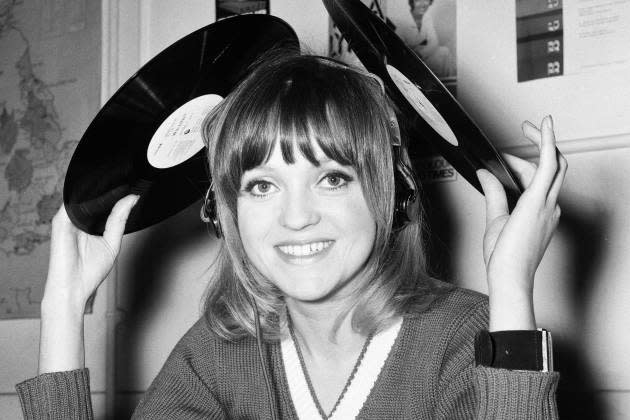Annie Nightingale, Pioneering BBC Radio DJ, Dies at 83
- Oops!Something went wrong.Please try again later.
- Oops!Something went wrong.Please try again later.

Pioneering BBC DJ Annie Nightingale — the first (and for 12 years, only) female DJ on the network’s Radio 1 station, whose embrace of multiple genres of music cast a vast influence on the country’s music fans — died Friday after a brief illness, according to The Guardian. She was 83.
Nightingale joined the station in 1970 and was revered for her enthusiastic support for multiple genres of music for the next half century, spanning progressive rock, punk, acid house, grime and more. She remained on the air until late last year, and was also well known for co-hosting the influential BBC weekly TV show, “The Old Grey Whistle Test.”
RIP Annie Nightingale. Such sad news. A pioneer on both radio and TV, a hugely important champion of great music, and a genuinely lovely person, as today's beautiful tributes prove pic.twitter.com/SEonakNlDa
— Birmingham 81 (@Birmingham_81) January 12, 2024
Her death was announced on Radio 1 by presenter Mollie King, who said, “I think I can say I speak for myself and other women in broadcasting when I say we owe her an immense amount of gratitude for everything she has done.”
A statement from her family reads in part: “Annie was a pioneer, trailblazer and an inspiration to many. Her impulse to share that enthusiasm with audiences remained undimmed after six decades of broadcasting on BBC TV and radio globally.
The coolest woman who ever graced the airwaves. She blazed a trail for us all and never compromised. Her passion for music never diminished.
Annie – My utmost respect and thanks for it all.
Much love Jo 🖤 pic.twitter.com/iMqoaJqvEw— Jo Whiley (@jowhiley) January 12, 2024
“Never underestimate the role model she became. Breaking down doors by refusing to bow down to sexual prejudice and male fear gave encouragement to generations of young women who, like Annie, only wanted to tell you about an amazing tune they had just heard.
“Watching Annie do this on television in the 1970s, most famously as a presenter on the BBC music show The Old Grey Whistle Test, or hearing her play the latest breakbeat techno on Radio One is testimony to someone who never stopped believing in the magic of rock ‘n’ roll.”
One of my great memories of Annie Nightingale – introducing The Damned on BBC Old Grey Whistle Test in November 1979 💙 https://t.co/2ug4LauUOK pic.twitter.com/xO9O7CAvfe
— 🎶Paul Lewis – Wycombe Gigs (@wycombegigs) January 12, 2024
Born in Middlesex in 1940, Nightingale began her career working for television and news outlets, becoming the host of a 1960s television music show called “That’s for Me.” She joined Radio 1 in 1970, thanks in part to support from longtime Beatles press officer Derek Taylor, and secured a regular afternoon slot shortly after. Her start followed a blossoming of British radio (inspired by the legendary pirate radio stations of the mid-1960s) and she said in her 2020 memoir, “From day one, I chose the records I wanted to play, and stuck to it ever since.”
I grew up with Annie Nightingale on radio & TV. She was a genuine music fan at a time when the airwaves were full of idiots like Noel Edmonds, who according to John Peel didn't have a record player in his house. RIP Annie pic.twitter.com/IqdSSyHZZD
— Michael Daly (@MichaelDaly64) January 12, 2024
For decades, the sound of her voice symbolized musical discovery and adventurousness — nearly 20 years into her career, she became a key advocate for acid house music. Audiences “thought of Annie as an eternally sympathetic figurehead who understood what they were going through, a sort of fabulous and unreconstructed goth auntie,” journalist Mark Ellen told the Observer in 2020. She also worked extensively as a club and festival DJ.
In 2002 she was awarded an OBE for services to radio broadcasting, and 18 years later, named CBE. She was also a strong booster for young DJs and broadcasters. In 2021, she launched the Radio 1 scholarships to help discover female and non-binary DJs. Yet most of all, her influence on the country’s musical tastes was vast.
“If I can play what I like and say what I like and encourage the young to do the same, then that’s the dream to me,” she told the Observer in 2020.
Best of Variety
From 'Killers of the Flower Moon' to 'Eileen': The Best Book-to-Screen Adaptations to Read This Year
The Best 'Sopranos' Merch to Celebrate the Show's 25th Anniversary
Sign up for Variety’s Newsletter. For the latest news, follow us on Facebook, Twitter, and Instagram.
